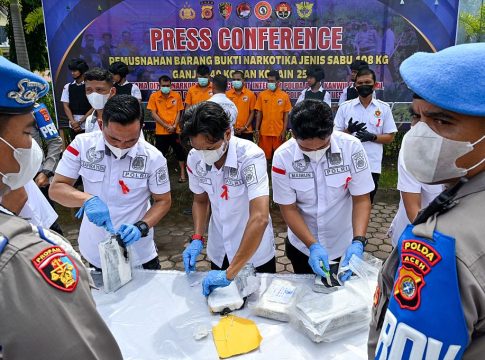Australia Faces Rising Threat from Transnational Crime Amid U.S. Withdrawal
As the landscape of transnational crime shifts, Australia is increasingly positioned at the forefront of emerging threats, largely due to a notable retreat by the United States in global law enforcement and developmental aid. This strategic withdrawal has profound implications for Australian security, as criminal syndicates seize the opportunity to expand their operations with remarkable speed and sophistication.
The Implications of U.S. Withdrawal
For decades, U.S. intelligence partnerships, development programs, and law enforcement initiatives served as crucial bulwarks against international crime. However, recent austerity measures have led to a freeze on funding for programs such as USAID, which once played a pivotal role in both humanitarian assistance and intelligence gathering. The U.S. Drug Enforcement Administration (DEA) has also reduced its overseas presence, closing key offices in regions critical for monitoring drug trafficking and money laundering.
- Fields of Impact:
- Reduction of DEA field offices from 93 to 69
- Vital closures in Myanmar, Indonesia, and southern China
- Programs that once stabilized and countered illicit activities are collapsing
The Surge in Synthetic Drug Production
With the U.S. disengagement, the Southeast Asia region has spiraled into a hub for synthetic drug production, particularly in the Mekong area. The surge in methamphetamine production has led to record levels of both availability and purity, challenging Australia’s border security and public health.
Statistics on Import Challenges
- Record seizures of methamphetamine at Australian borders highlight the scale of this evolving crisis.
- Criminal syndicates are diversifying their routes, increasingly routing drugs through India and Africa into Australia—transforming it into both a destination and transit point for narcotics.
A New Strategic Landscape
In the absence of a strong U.S. presence, China is emerging as a significant player in organized crime networks, leveraging initiatives like the Belt and Road project to embed its criminal elements into regional infrastructure. According to an April 2024 report from the U.S. Congressional Select Committee on the Chinese Communist Party, Chinese crime groups are identified as key facilitators in the global synthetic drug trade, albeit with tacit approval from the Chinese government.
The Need for a Proactive Response
Given these dynamics, it is imperative that Australia recalibrates its approach to national security. Experts advocate for a multi-faceted strategy:
- Increase the presence of the Australian Federal Police (AFP) and intelligence agencies in Southeast Asia to actively combat illicit networks.
- Forge stronger partnerships with countries in the region to enhance intelligence sharing and collaborative investigations.
- Recognize transnational crime as a critical geopolitical challenge, rather than merely a law enforcement issue.
“The world’s new transnational crime syndicates don’t just smuggle drugs—they destabilize entire regions and threaten public trust in institutions,” notes a senior security analyst.
With Australia’s favorable geographic and economic factors making it a prime target for exploitation, the time to act is now. As the patterns of global crime evolve, so too must Australia’s strategies to protect its borders and uphold regional stability. The consequences of inaction could resonate far beyond its immediate impacts.

Focuses on crime, public safety, and regional events.
Bio: Marcus is a community-based journalist passionate about reporting impactful stories that matter most to readers.

